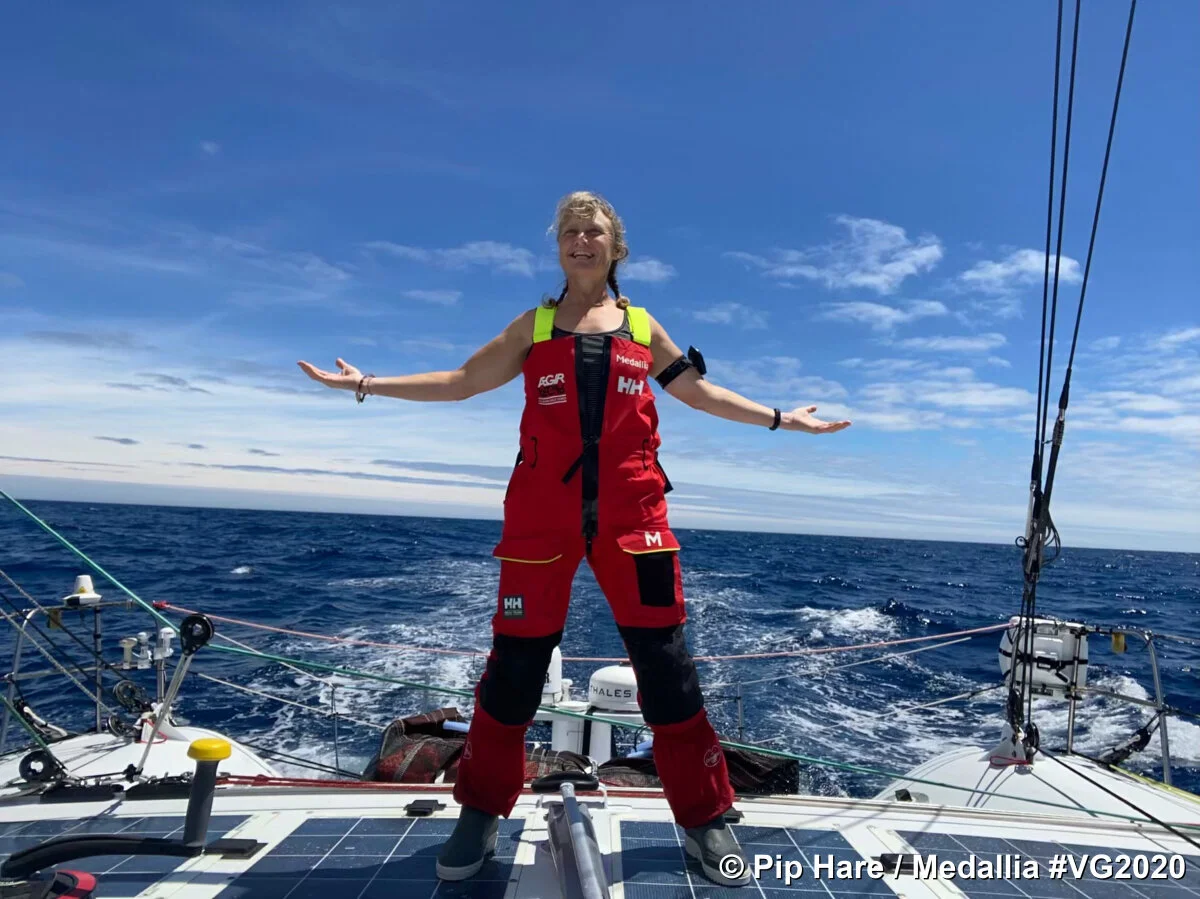Lateral thinking and fixing problems
At 2am, in the pitch dark with no moon and building breeze, the tack line on my code zero broke. It went with a loud bang. I was at the mast already tucking in an extra reef as I had been watching the wind slowly building from my beanbag down below. This is often how I spend my nights. Sheltering from the cold and the wet down below, reclining on the floor, propped up by a beanbag behind my head and staring at a screen full of numbers. If the numbers are within limits I will sleep, setting my alarm for 30 or 45 minutes to wake up and check them again. If the numbers are marginal I doze, eyes closed and drifting in a nearly sleeping state, somehow with my mind relaxed yet alert to a greater angle of heel, the increased rush of water past the hull and indication that the breeze is on the rise.
When the wind reached 27 knots I upheld the deal I had made with myself, hauled my body out of the beanbag - no mean feat against gravity and with a slippery beanbag underneath me that slides and reforms every time I try to push myself up out of it.
Dry-suited and booted, I trudged on deck with a headtorch and safety harness and was dropping the last few meters of main halyard when the code zero tack went.
At first I did not realise what it was. The force of the sail blowing upwards had ripped the outrigger from its location on the deck. I couldn't see the sail but saw the outrigger and assumed that one of the linkages holding that forwards had broken. Medallia felt a little wild, heeling over more, slightly less controlled. One job at a time, I finished putting in the reef as quickly as possible. I put the boat on a downwind course to decrease the apparent wind in the headsails and I wandered forwards with my search light and saw the sail, flying up in the air, the tack line was broken so the sail was attached only at the top and back corners of the triangle, the only thing stopping the whole sail from wildly flailing around was the furling line hooked under the pulpit, the force of which was bending the metal framework upwards.
My mind raced; at once I went through several scenarios for how this could go. Somehow I needed to get the sail under control. The first option appeared to be to get it down but the risk in this was huge. Normally we roll these sails up into a tight sausage before lowering them to the deck. In this form they have very little windage, they are manageable and most importantly small. I was not able to furl this sail as to perform this the front edge needs to be stretched tight between the tack and the head. This would mean me, one small person in the middle of the night, battling with the full surface area of the sail, in 27 knots of wind, trying to drag it under control some 25 metres out of the sky, and land it safely on the deck of Medallia without it going in the water where, with the speed of the boat, it would be ripped out of my hands for good. In a split second I was able to visualise this scenario and it wasn't good. I could see many outcomes some lucky, some not so lucky – all with risk and all with complete exhaustion.
I needed another solution and fixed on the fact that the furling line was in fact, for the minute and while the pulpit remained in place, holding the sail in position, albeit high in the air. For the moment the tack was out of reach but, if I was able to bring the tack of the sail down low enough for me to reach it safely, I could put my spare tack line onto the sail and haul it down in that way. I needed to act quickly but make no mistakes, getting ropes jammed or putting extra load on anything at this stage could lead to further and more difficult problems.
In the back of the boat I sorted out the necessary blocks and winches, carefully tying ropes off, re-leading lines, trying very hard not to rush and not to make mistakes. My heart was thumping hard. It wasn't difficult work, just stressful. Very slowly and with extreme care I started to wind on both sides of my furling line, looking forward with my torch to check when the sail was low enough to reach, then going forwards into the dark, with a line to tie the sail off while I worked to change over the tacklines. The whole job was done in an hour and Medallia was off flying at 16 knots again. The night was still black and I sat for a moment thinking about how lucky I had been. Lucky the line had broken while I was on deck, lucky I had not had to battle with taking a full size flogging sail out of the sky, lucky that Medallia is such a strong boat to cope with these mishaps.
I have now put a system in place where there are always two tack lines on my furling sails. Those lines are put under one hell of a load and those sails will be my work horses for at least the next six weeks while I am racing through the southern ocean. With a second 'safety' tackline in place I will be able to sleep in the knowledge the sail will be contained until I am next on deck. In this way Medallia and I are evolving, we are adapting, we are learning.
It is often the way with racing a boat this size on your own that the first solution is not the obvious one and I have often said this is why I believe we are able to race men and women on equal terms in this incredible sport. Rushing in to wrestle that sail out of the sky was the wrong answer and had I been perhaps bigger, or more physically strong I may have been more inclined to try. But stepping back for a second gave me the right solution.
It is not always easy to step back from a crisis situation and think. It requires a calm state, a confidence to withdraw momentarily and the ability to put aside the feelings of fear or stress and focus clearly on finding a solution. On reflection I think this is something I have learned to do through my sailing career. I know well that icy grip of fear and how it has the ability to paralyse you and to turn your brain in circles. But when you are alone on a boat in the middle of the ocean there is simply no one else to take charge. The fear cannot take control. It keeps you sharp but you must learn to suppress it.
I don't consider myself to be a particularly brave person, I don't think this is a characteristic you are born with. I think my sport has taught me how to control my fear and think clearly in a crisis. I do this not because I enjoy the stress or want to be a hero, but because I love my sport. I am driven to compete at the highest level I can possibly achieve and with the euphoria of screaming through the world’s most beautiful oceans on a beautiful race boat, comes the acceptance that at times I will be challenged and I will be scared.

